Parrots are one of the more common exotic pets that you can own. You’ll find them in many pet stores and hundreds of breeders across the United States. However, that doesn’t make them cheap!
It’s easy for parrots to cost over $1,000 – and that’s not counting all the costs accompanying owning a bird, too. Owning one of these birds is very costly when you add everything up.
Below, we’ll look at how much a parrot costs, which varies greatly from species to species.
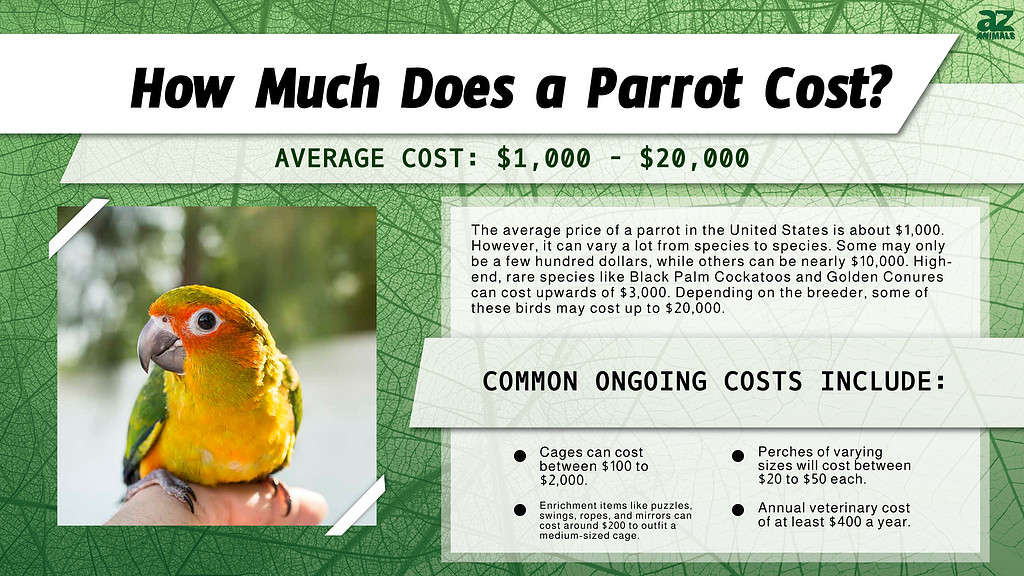
How Much Does a Parrot Cost?
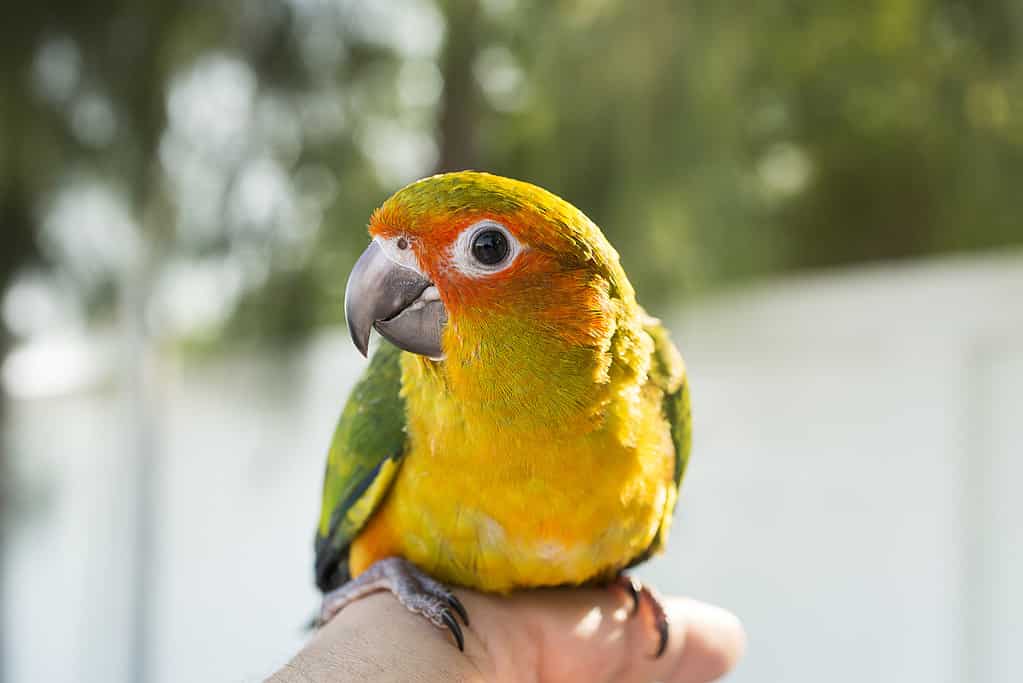
The price of a parrot depends largely on the species.
©iStock.com/Thirawatana Phaisalratana
The average price of a parrot in the United States is about $1,000. However, it can vary a lot from species to species. Some may only be a few hundred dollars, while others can be nearly $10,000.
Selecting a species is important, as it affects the bird’s behavior, health, and cost. Some common parrots like budgies, cockatiels, and lovebirds may cost around $200. Mid-range parrots like African Greys and Eclectus Parrots cost between $800 to $3,000.
High-end, rare species like Black Palm Cockatoos and Golden Conures can cost upwards of $3,000. Depending on the breeder, some of these birds may cost up to $20,000.
Rarity and demand are key factors in determining a parrot species’ price. Exotic or endangered species in high demand have higher price tags. Parrots that are difficult to breed in captivity and not commonly found in the market can be sold for higher prices because of their rarity and the effort it takes to breed them.
The cost of a parrot can depend on its age and maturity. Usually, younger birds are more expensive than older ones.
Parrots with uncommon colors or special features may be worth more because people prefer them and breed them selectively.
You can save money and help a parrot in need by adopting from a rescue or shelter. Adoption fees vary depending on the organization, the type of parrot, its age, and its condition.
Parrot Cage Setup Prices
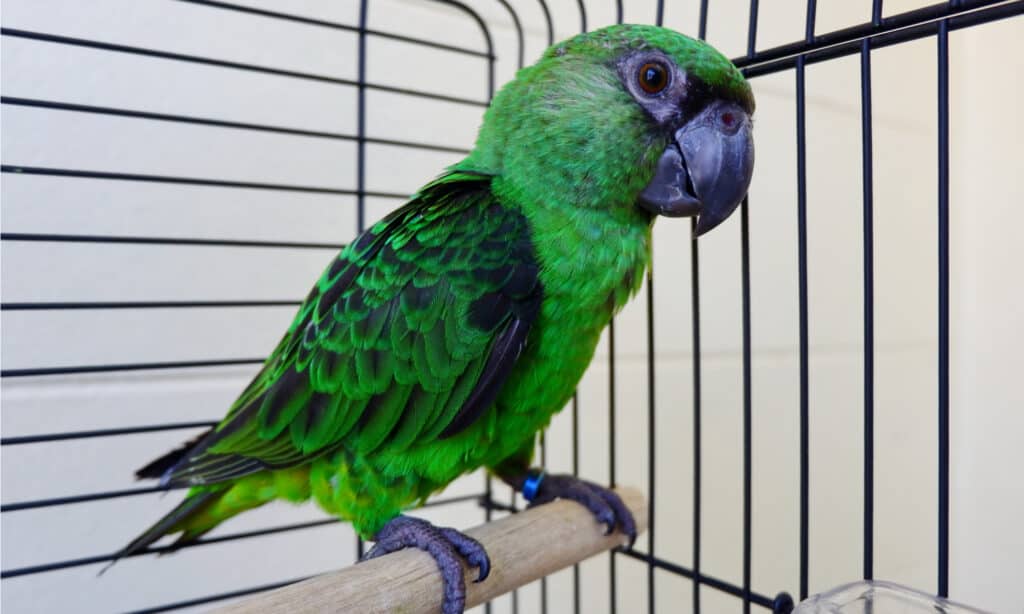
Your parrot’s cage is very important, though it may be costly.
©THANYAKRIS/Shutterstock.com
You’ll need to create a suitable environment for your parrot to live in. Cages and the necessary equipment that goes with them can vary a lot in price.
The size and type of cage you need will depend on the species of parrot you choose. Often, people underestimate the amount of space a bird takes up. The minimum cage recommendations are just that – the minimum. You should plan on purchasing a bigger cage to ensure your bird has plenty of room to exercise.
Larger species will typically need bigger cages than smaller species, like budgies. If you have less room, you should generally choose a smaller bird.
Cages can cost between $100 to $2,000. Plan on this being a considerable expense.
You’ll also need several cage accessories. For instance, perches of varying sizes are necessary and will cost between $20 to $50 each. Sometimes, cages do come with a perch or two. You’ll also need feeding dishes and a bowl for bathing.
Because parrots are intelligent animals, they require enrichment items like puzzles, swings, ropes, and mirrors. These can vary widely in cost, but you should plan on spending around $200 to outfit a medium-sized cage. These items will need to be replaced often, as well.
The cost of a parrot cage setup can vary based on cage size, quality, and accessories. Larger cages and specialized accessories may have a higher price, but they’re essential for your parrot’s comfort and happiness.
Veterinary Expenses
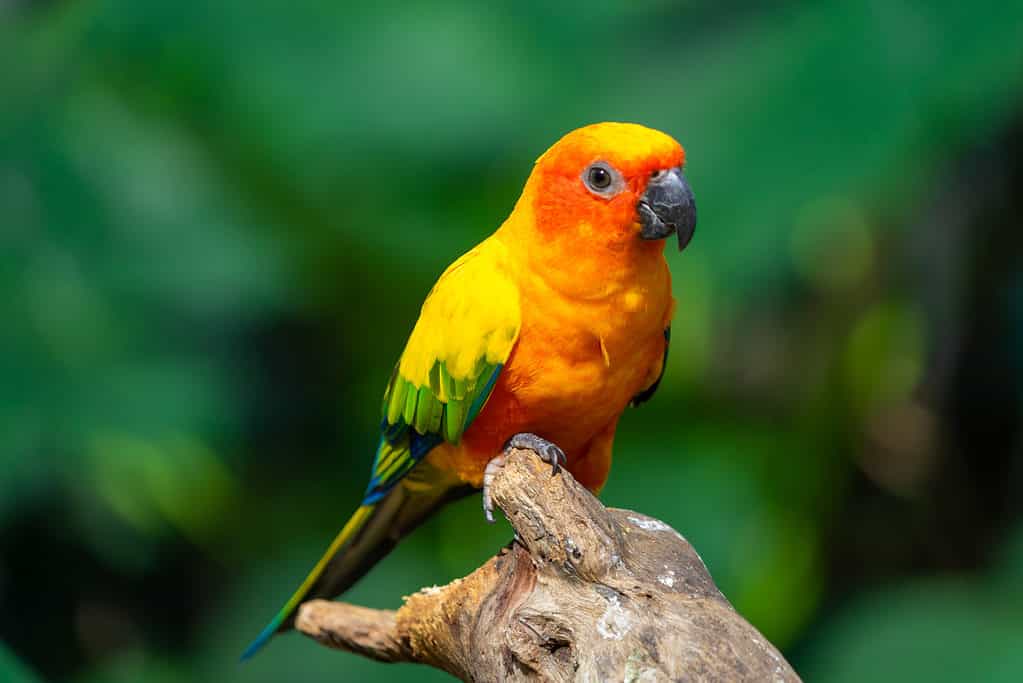
All parrots require veterinary care, though the exact cost will depend on the species.
©iStock.com/Kevin Kaiser
Parrots will need veterinary expenses, just like any other animal. Veterinary expenses are an important aspect of owning a parrot, and budgeting for these costs is essential.
When you first adopt your parrot, you’ll need to schedule a health examination with your chosen veterinarian. This examination helps establish your bird as a patient and ensures there aren’t any underlying health problems.
Some species may even need vaccinations to protect from common illnesses.
After that initial visit, you’ll need to perform a regular check-up to monitor their overall health and detect any potential problems. An annual wellness visit helps identify problems early so that they can be treated. You may also need to get several preventative measures done, like parasite control and nail trimming.
You’ll also need to budget for emergency care. You never know when your parrot will get sick or have an accident. Because this specific health care is hard to budget for, having an emergency fund “just in case” is a great option.
It’s important to research and find a reputable avian veterinarian with experience in treating parrots. Veterinary expenses can vary based on location and the specific services required. However, you should have an emergency fund of at least a few thousand dollars, as well as budget an annual cost of at least $400 a year.
Parrot Grooming & Maintenance Prices
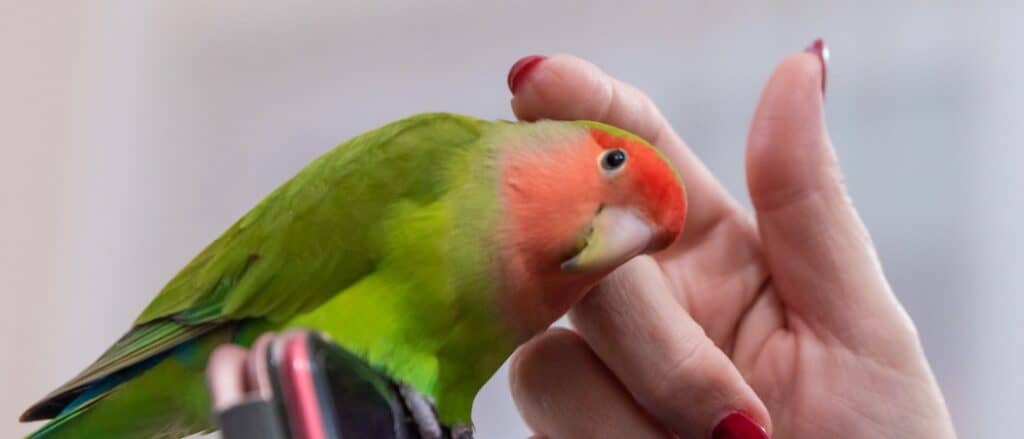
Account for grooming needs and vet care when you make your budget for a parrot.
©iStock.com/BlankeZr
Taking care of your parrot requires regular grooming and maintenance. This helps keep your parrot healthy and looking good. It’s also important to keep their living space clean and safe.
Parrots are often very good at keeping themselves clean. Most parrots will preen, which means that they use their beak to clean and align their feathers. In many cases, your parrot won’t need your help in this regard.
However, a parrot will need help with other aspects of their grooming. For instance, parrots often have beaks that continuously grow. You’ll need to occasionally trim their beak to prevent overgrowth. You can do this at home if you know how, though the best option is usually to visit a vet or specialized groomer.
Nail trimmings are also necessary, as their nails will continue to grow long and sharp. A veterinarian can take care of this, too, though your parrot may need more than an annual visit.
You’ll need to clean your parrot’s cage regularly, including all of their perches and toys. While this isn’t expensive, you will need to use bird-safe cleaning products, which you’ll have to restock occasionally. You can expect this to cost only a few dollars a month.
Some birds, like African Greys, produce feather dust. If you choose one of these parrots, you may have to do extra cleaning and ensure proper ventilation. Often, using an air purifier (which can cost hundreds of dollars) is recommended.
The photo featured at the top of this post is © Charles Bergman/Shutterstock.com
Thank you for reading! Have some feedback for us? Contact the AZ Animals editorial team.






